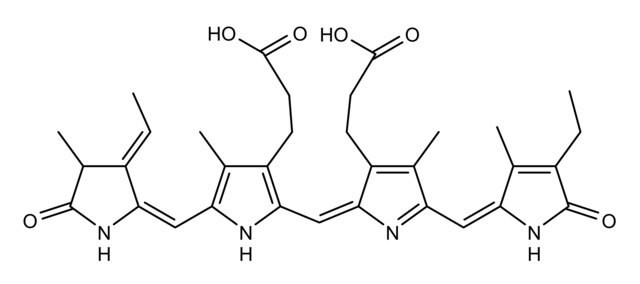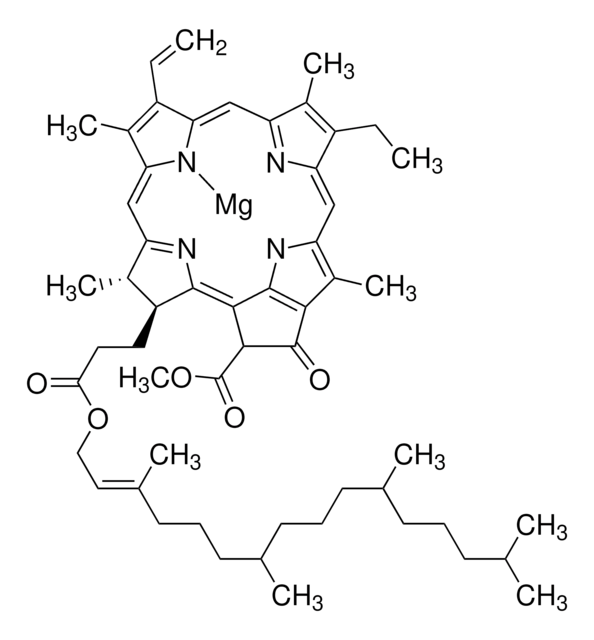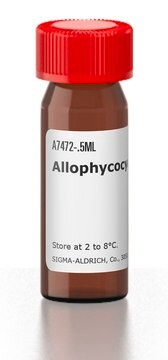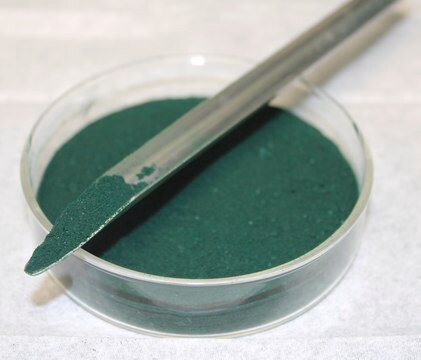About This Item
Kod UNSPSC:
12352108
NACRES:
NA.32
Polecane produkty
stężenie
≥10.0 mg/mL (UV)
metody
electrophoresis: suitable
fluorescencja
λex 609 nm; λem 643 nm in 0.1 M phosphate pH 7.2
przydatność
in accordance for gel electrophoresis
temp. przechowywania
2-8°C
Opis ogólny
The product is suspended in 150 mM sodium phosphate, 60% ammonium sulfate, 1 mM EDTA, 1 mM sodium azide, pH 7.0 and must be dialyzed against conjugation buffer or PBS before conjugation.
Zastosowanie
C-Phycocyanin (CPC), a pigment-protein complex from the light-harvesting phycobiliprotein family, may be used in immunoassay kit development and to study its properties as a light harvesting protein.
Opakowanie
Bottomless glass bottle. Contents are inside inserted fused cone.
Komentarz do analizy
A620/A280 >3.5, A651/A620 <0.3
This page may contain text that has been machine translated.
Kod klasy składowania
10 - Combustible liquids
Klasa zagrożenia wodnego (WGK)
WGK 3
Temperatura zapłonu (°F)
Not applicable
Temperatura zapłonu (°C)
Not applicable
Środki ochrony indywidualnej
Faceshields, Gloves, Goggles
Certyfikaty analizy (CoA)
Poszukaj Certyfikaty analizy (CoA), wpisując numer partii/serii produktów. Numery serii i partii można znaleźć na etykiecie produktu po słowach „seria” lub „partia”.
Masz już ten produkt?
Dokumenty związane z niedawno zakupionymi produktami zostały zamieszczone w Bibliotece dokumentów.
H Scheer et al.
Molecular microbiology, 68(2), 263-276 (2008-02-21)
Biliproteins are a widespread group of brilliantly coloured photoreceptors characterized by linear tetrapyrrolic chromophores, bilins, which are covalently bound to the apoproteins via relatively stable thioether bonds. Covalent binding stabilizes the chromoproteins and is mandatory for phycobilisome assembly; and, it
Jordan M Womick et al.
The journal of physical chemistry. B, 113(48), 15771-15782 (2009-11-12)
The electronic structure and photoinduced relaxation dynamics of the cyanobacterial light harvesting protein, C-Phycocyanin (CPC), are examined using transient grating and two-dimensional (2D) photon echo spectroscopies possessing sub-20 fs time resolution. In combination with linear absorption and fluorescence measurements, these
Michaela Kupka et al.
Biochimica et biophysica acta, 1777(1), 94-103 (2007-11-27)
Optical spectroscopic properties of the covalently linked chromophores of biliproteins are profoundly influenced by the state of the protein. This has been used to monitor the urea-induced denaturation of C-phycocyanin (CPC) from Mastigocladus laminosus and its subunits. Under equilibrium conditions
Lijin Tian et al.
The journal of physical chemistry. B, 117(38), 11000-11006 (2012-12-18)
Cyanobacteria are oxygen-evolving photosynthetic organisms that harvest sunlight and convert excitation energy into chemical energy. Most of the light is absorbed by large light harvesting complexes called phycobilisomes (PBs). In high-light conditions, cyanobacteria switch on a photoprotective mechanism called non-photochemical
Rasiah Pratheepa Kumari et al.
Biological trace element research, 151(1), 59-67 (2012-10-23)
The present investigation is aimed to evaluate the anticataractogenic potential of C-phycocyanin (C-PC), extracted and purified from Spirulina platensis. Enucleated rat lenses were maintained in vitro in Dulbecco's modified Eagle medium (DMEM). Group I contained DMEM, Group II and Group
Nasz zespół naukowców ma doświadczenie we wszystkich obszarach badań, w tym w naukach przyrodniczych, materiałoznawstwie, syntezie chemicznej, chromatografii, analityce i wielu innych dziedzinach.
Skontaktuj się z zespołem ds. pomocy technicznej






